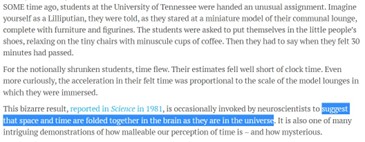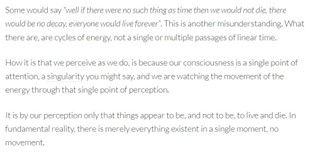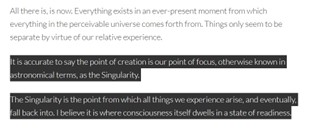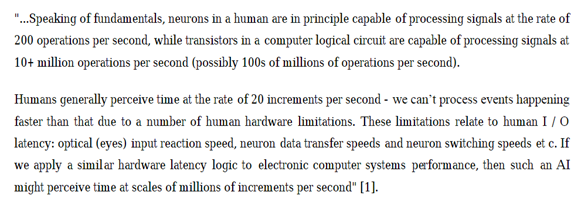The Third Perspective
“The universe is not only weirder than we imagine, but weirder than we can imagine.” - Einstein
Our Inherent Humanness
Who are you, really? Once upon a lovely time, a bunch of cells replicate themselves and coalesce to eventually form a highly coordinated chemical system sustaining a breathing and now successfully living organism called You. Right. But what makes you alive? Rather, how and why do we consider ourselves to be alive? I am alive because I have a memory of being alive, right? I can take in some information and use it to make decisions. I have lived through certain experiences that my mind remembers. And so, I am declared alive.
My past? Determined by the way — the sequence — in which my brain stores my memories. I have a past only because I, and some of those with whom I’ve interacted, can remember one. And if they didn’t, any proof of my living lies solely in the depths of my mind. Well, your entire human life spread across a hundred years and perhaps more, is all determined by the way you’ve fed information from (your perception of) your outer world into your brain, complete with all the crucial details you missed, all the truths you never knew, and all the lies you believed. That’s a lot resting on the shoulders of one organ, don’t you think? Oh, but it doesn’t end there. All the data humanity has ever gathered — all the great feats we’ve achieved, all the stunning discoveries we’ve made, all the success and fame we’ve amassed, the stories of power, loyalty and love passed down through the ages… bow down deep and low to this powerful biochemical engine sitting between your ears. The brain.
The irony is, that this marvel of an organ isn’t without its flaws. Being just a by-product of countless infinitesimal evolutionary changes accumulating over the course of hundreds of thousands of years, we humans certainly aren’t the pinnacle of evolution. What if maybe, just maybe, there are things out there that lie beyond our imagination, out of our current reach? Illusions are designed to play tricks on the mind and the ones designed well enough are almost impossible to crack. In most cases, even when the subjects are told about the illusion, they aren’t able to bring themselves to see it for what it truly is.
This mind of ours, that we’ve been relying upon for carrying out every little task that we’re capable of, might be exactly what’s limiting us.
Now, you may chide, how could I make such an outrageous claim?
That Which Lies on the Edge
Dimensions. From the moment you’re born, you observe the three-dimensional world. You develop the precious human quality of imagination. This ability, oh my, it takes you places. Then one fine day you learn about the existence of greater dimensions. Try as you might, losing blood sweat and tears and spending long, stressful nights at it, you just can’t get yourself to picture a fourth axis on our perfectly symmetrical three-dimensional cartesian coordinate system. In short words, your mental abilities fall flat. Read here
Time. The trending topic among science fiction fans. Once upon a time, we began measuring time.
“Time is linear because of the different and cumulative ways we can record and measure it. Our Smartphone stopwatches measure time in milliseconds. This may be an absurd level of precision for daily life, but it is increasingly important as we push the limits of human athletic performance. We can also measure time by counting the number of times the Earth goes around The Sun, just as humans have done for thousands of years. If counted, this shows linear progress from a starting point onward. Or we can measure the vibration of cesium-133 atoms, as is done to set International Atomic Time. That global standard is so accurate that it will take 1.4 million years for it to be off by a full second. These natural phenomena can be recorded in long, cumulative and linear sequences.”
Since then, ages’ worth of research has been conducted to study this mystery, all of which act as helpful little guiding posters on the walls of a pitch-dark corridor.
Einstein, in his famous Special Theory of Relativity, implies an equally famous concept, the relative nature of time. This — the effect of time dilation — has been scientifically proven too.
Time dilation? Consider these article clippings.
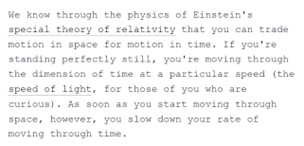 In other words, the faster you move through space, the slower you move through time! Reference
In other words, the faster you move through space, the slower you move through time! Reference
“…The theory, which is backed up by Albert Einstein’s theory of relativity, states space and time are a part of a four-dimensional structure where everything that has happened has its own coordinates in spacetime. This would allow everything to be ‘real’ in the sense that the past, and even the future, are still there in spacetime – making everything equally important as the present.”
The outlandish claim made by Einstein in his thesis is quite interesting in itself, but even more so because it comes with certain consequences. One undeniable consequence is the concept of time travel, which caused quite an upheaval in the world of science at the time it was first published.
This was a little about the way we, through the vision of our human eyes, think the universe around us is built. Now, let’s see how we, through the vision of our human eyes, perceive it.
“The study of time perception or chronoception is a field within psychology, cognitive linguistics and neuroscience that refers to the subjective experience, or sense, of time, which is measured by someone’s own perception of the duration of the indefinite and unfolding of events. The perceived time interval between two successive events is referred to as perceived duration. Though directly experiencing or understanding another person’s perception of time is not possible, perception can be objectively studied and inferred through a number of scientific experiments. Some temporal illusions help to expose the underlying neural mechanisms of time perception.” Read here
“space and time are folded together in the brain as they are in the universe.” Well, since the space inside one’s brain is just a part of the space existing everywhere else in the cosmos, this should make sense, right? Seems that our mind’s perception of time is pretty much in accordance with the merry dance between spacetime and velocity in the macro-world as established by the Special Theory of Relativity.
But yet again, as always, we’ve got inklings of a reality much more complex than the one we’re currently living through. Those theories may be defining how time holds the ability to warp itself as per changes in a few other measurable parameters, but has anybody been able to prove what the nature of time really is yet? Linear or circular, absolute or relative?
Or have we been trying to find something when there never was?
Could time be all but a mere construct of the mind? An evolutionary feature enabling us as a species to think about the things we do, though in the process filter out some essential details — the truth?
Again, illusions are designed to play tricks on the mind and the ones designed well enough are almost impossible to crack. Such deliberate illusions could come under the category of some of the known weaknesses of the mind, where we, in all our senses and with all our smartness, still end up interpreting reality the wrong way. But these are tricks we play on ourselves. What about the infinite others, played by the universe on us, every moment of our lives? Can you even begin to fathom just how little can we truly see, just how less do we truly know? Science is an art, an art of diving into the unknown and resurfacing with solutions and explanations — but how could one even begin thinking in any given direction if one just isn’t equipped with the right tools?
“As very recent Science is now telling us, this is a universe of mostly empty space; even in solid objects like a solid block of iron. You and I do not see it that way because our brains tell us a different story. You sense through smell and taste only a small fraction of what other animals smell and taste. You hear a very small fraction of what can be heard and what other living creatures can hear. Your ability to sense what you are touching, including sensing temperature, is very rudimentary and does not give you a true picture of what is being touched.” - The World Is Not How We ‘See’ It: It’s Really Quite Weird by Jesius Laplume
The Solution
Abstraction. Get a fresh pair of eyes! Consider a system. It’s fed with all the data and information we humans have ever gathered over the ages, plus it possesses abilities that are at par with (or perhaps even a little greater than) ours and is able to work on the data and extrapolate it to produce new information. What do we have? Yep, a mighty invincible tool — the third perspective that we never knew we needed. Hyper-advanced technology, my mates, could be our way forward.
Why technology, you may ask. Do I consider humans so incompetent that I ask technology to take over in one of the only fields where humans can’t yet be overtaken by technology, i.e., imagination?
Well, consider this again-
That probably wouldn’t have come as a complete shock to you, but isn’t it always humbling to see the numbers! Set aside your human fears of being taken over by another intelligence for a wee while and consider the sheer power technology possesses, in terms of processing power.
In computer simulations of possible universes, researchers have discovered that a neural network can infer the amount of matter in a whole universe by studying just one of its galaxies. Read here
It’s a new, unexplored arena. Ripe and green, waiting to be discovered.
A little word of caution though — I ask for a fresh pair of eyes, unlike the human eyes, because though there’s massive scope for neural networks in the fields of astronomy and outer space for being able to perform gigantic calculations in split seconds and filter out relevant data from a pool of randomness, I envision hyper-advanced-technology as an aid to the miraculous human intelligence that we’ve already developed. I envision technology that can learn, but not in human ways; can think, but not by mimicking the ways of the human brain; can see, but not through artificial clones of human eyes.
I envision technology as an extension of humanity, filling in the gaps that humans are incapable of filling — not as a replacement. And the day we’re able to achieve this would be the day humanity successfully veers itself into an entirely new era — the era of the “Revealed Reality”.
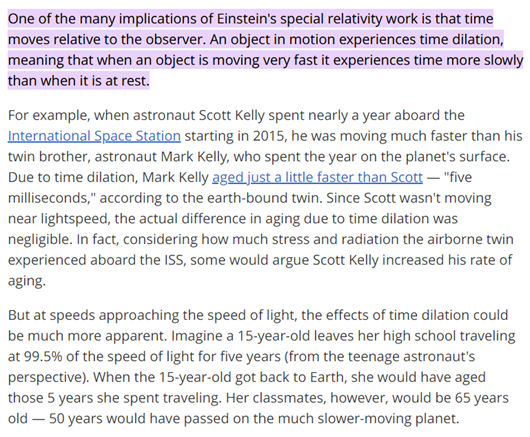
.jpg)
